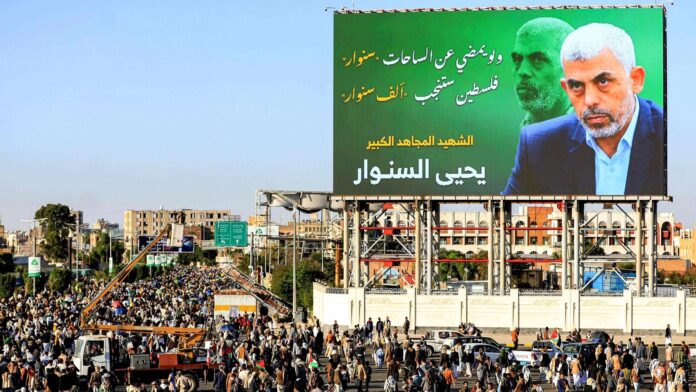Yahya Sinwar, the mastermind behind the October 7 Hamas attack on Israel, has reportedly been killed. Images of Sinwar, draped in military fatigues and covered in dust with a possibly amputated hand, show him striking an Israeli drone in what appear to be his final moments. These visuals have sparked contrasting narratives—triumphalism and revenge in Israel, met with renewed resolve for resistance across the Arab world.
The question now is: does Sinwar’s killing offer a “victory narrative” and the possibility of ending the war, or as Israeli Prime Minister Benjamin Netanyahu suggests, is this merely “the beginning of an end”? More critically, does the conflict now rest on Israel and Netanyahu’s decisions, or will it spiral into a cycle of revenge fuelled by the politics of martyrdom and resistance?
Read this | Sinwar’s death gives Israel a choice: To pursue war or peace
War for the future of Gaza?
The US was quick to declare that justice has been served with the killing of Yahya Sinwar, suggesting this development could pave the way for a ceasefire and a potential hostage deal—Sinwar having been seen as an obstacle to negotiations. However, while the US may seek to project optimism or assert its relevance by influencing its belligerent ally Israel and pushing for a ceasefire, it is crucial to acknowledge that this war extends far beyond the killing of key Hamas leaders or even the weakening of the Iran-backed “axis of resistance”.
This war for Israel revolves around the future of Gaza and the Palestinians, rooted in narratives of existential threats, questions of state identity, and historical patterns that resist predictions—or even hopes—of a ceasefire. The conflict was triggered by Hamas’ unprecedented terrorist attack on 7 October 2023, which killed approximately 1,200 people and resulted in the capture of 251 hostages, 97 of whom remain in captivity. Israel’s response has also been unprecedented, marked by a disproportionate level of violence, with nearly 41,000 lives lost and approximately 1.9 million people displaced. Gaza remains under siege, with no food assistance allowed into Northern Gaza for over two weeks now, exacerbating the humanitarian crisis.
History reveals that since Israel’s 2005 withdrawal from Gaza, the region has operated as an “open-air prison”. In the aftermath of the 7 October attack, Israel’s relentless bombardment by land, sea, and air has turned Gaza into a graveyard, with the rubble symbolizing not only destruction but also Israel’s resolve to mete out both humiliation and punishment on Palestinians.
Operation Iron Swords: A second Nakba?
What remains before Netanyahu signals not just the beginning of the end, but the end?
It is essential to place the Israel-Hamas war within its historical context. This conflict didn’t begin on 7 October—it is rooted in longstanding struggles over statehood, self-determination, and settler colonialism, stretching back to 1948. While both sides have suffered losses, it’s crucial to recognize that even in Israel’s self-defence, the scale of violence has been disproportionate.
Israel’s Operation Iron Swords, launched soon after Hamas’ 7 October attacks, goes beyond conventional notions of military victory or the termination of a war. This conflict will not conclude with the assassination of key Hamas leaders, as Israel’s objectives are far more extensive—this is an existential conflict. For Israel, securing its borders and removing perceived threats is non-negotiable.
Many scholars, including Avi Shlaim, suggest that the ongoing campaign bears the hallmarks of a “second Nakba,” or a renewed struggle for independence, driven by the need to establish security and identity. Despite its aggressive approach, Israel continues to receive both material and ideological support from the US and its Western allies, reinforcing the broader stakes at play in this enduring conflict.
Will Israel return to the negotiating table? Bleak optimism
Whether Israel will return to the negotiating table remains an open question, clouded by cautious optimism. However, the likelihood of Israel continuing its siege on Gaza seems high, given historical patterns and the broader objectives driving this conflict. Is this a case of bleak optimism? Indeed, it is.
Also read | Israel’s latest Hamas assassination could have serious repercussions for India
Further this is a clarion call to the US and its Western allies, who must stop turning a blind eye to the unfolding humanitarian catastrophe and actively push for a ceasefire. Any hopes for a military resolution may prove short-lived—while Israel might succeed in weakening Hamas militarily, it is unlikely to extinguish the entrenched political spirit of resistance across the Arab world.
#killing #Yahya #Sinwar #endgame
